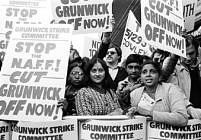PART 6
Trade Unions and the Conservatives
After several decades of influence with both Labour and Conservative administrations, trade unions and the TUC faced hostility from Conservative governments between 1979 and 1997 and an 'arms-length' relationship with Labour governments since.
Popular revulsion against the first (1979) government of Margaret Thatcher was fragmented with the 1981 right-wing breakaway (led by Roy Jenkins and David Owen) from the Labour Party to form the Social Democratic Party (later merged into the Liberal Democrats). Large Conservative majorities followed at the 1983 and 1987 general elections. Thatcher herself was deposed in 1990, partly as a result of the mass disaffection generated by the poll tax, but the Conservatives under John Major won the 1992 election.
The Conservatives eased unions out of many institutions that were based on 'tripartism' (an earlier form of 'social partnership'). The most important were the various Industrial Training Boards, which were generally abolished. The most symbolic move was the downgrading and eventual termination (in 1992) of the National Economic Development Council, where six TUC leaders had met leading employers and government ministers monthly since 1962. The TUC also lost its monopoly on nominating trade unionists to public bodies (such as employment tribunals).
In 1984 the government banned trade union membership among its employees at the Government Communications Headquarters (GCHQ) at Cheltenham. There was such a reaction by unions to this policy that, although it was not reversed until Labour came into office, the Conservatives did not repeat it elsewhere.
More potently, Conservative governments passed a series of laws - in 1980, 1982, 1984, 1988, 1990 and 1993 - which, cumulatively, greatly restricted and controlled trade union activity. This process reversed the historic role of most governments since the 1870s: to protect unions, by legislation, from court judgments that seriously interfered with their functioning in peacetime.
In the early 1980s, a policy of active opposition to the anti-union laws was won at the TUC, with activists hoping to repeat the successful (though often unofficial) movement against the Industrial Relations Act of 1971. But they faced a very different economic situation, a much more determined government and employers emboldened to exploit the changed balance of power. At critical moments some unions, in a weak position, looked to the TUC General Council to organise support action but this was never going to happen. TUC General Secretaries (Len Murray, 1973-84, and Norman Willis, 1984-93) were not going to risk the TUC directly breaking the law (however distasteful that law was).
Trade Unions and Labour
Trade unions' relationship with the Labour Party also changed. After 1979 an electoral college gave unions (with their large affiliated membership to the party) a direct vote for the first time in the election of the Labour Party leader and deputy. The Labour leadership's quest for electability in a period of Conservative dominance saw it shift from a left-wing programme at the beginning of the 1980s to gradually accept many of the Conservative changes. From Labour's link with unions having been seen as an electoral asset in the mid-1970s, the Conservatives had turned it into an electoral liability by skilfully exploiting and exaggerating the so-called 'Winter of Discontent' under the Labour government in 1978-79.
Opposition leaders came and went: Michael Foot (1981-83), Neil Kinnock (1983-92), and John Smith (1992-94) who died in office. When Tony Blair became leader in 1994, he campaigned to drop the longstanding Clause 4 of the Labour Party constitution (of 1918), with its emphasis on 'common ownership' - part of his 'New Labour' project. It was replaced by a weaker formulation that also embraced 'the enterprise of the market and the rigour of competition'. With the collapse of the Eastern European states and the Soviet Union in 1989-91 (precipitating the effective disintegration of the Communist Party of Great Britain), socialist ideas were in retreat before a tide of rampant capitalism.
A lifeline for the unions came from an unlikely source. The two dominant union leaders of the 1970s, Jack Jones and Hugh Scanlon, had campaigned publicly for a 'no' vote in the 1975 national referendum on Britain's continued membership of the European Economic Community. Yet, at the 1988 TUC, Jacques Delors, the European Commission president, was enthusiastically received when he laid out his vision of a Europe with social rights at its heart. By 1995, the TUC had come out in support of statutory rights to representation (as in most of Europe), abandoning its long-held belief in voluntarism in this area. Increasingly Europe (rather than the British government) is the source of most individual employment rights, such as the Working Time Directive (with its right to paid holidays), health and safety law, and rights to consultation.
Dave Lyddon, Centre for Industrial Relations, Keele University
Back to top







